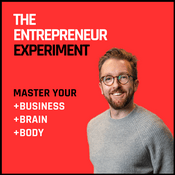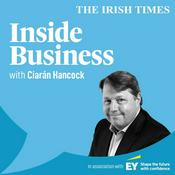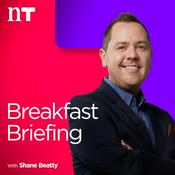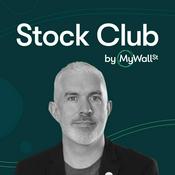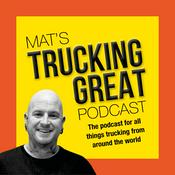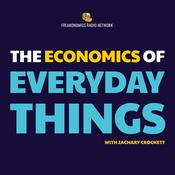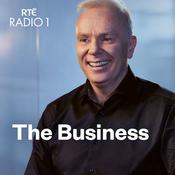136 episodes
- Send us a text
What if the path to career success and personal fulfillment requires embracing fear rather than avoiding it? Jill Schulman, Marine Corps veteran and author of "The Bravery Effect," reveals a transformative understanding of bravery that challenges conventional wisdom.
Forget everything you thought you knew about courage. Schulman defines bravery as "taking voluntary action in the presence of fear toward a worthwhile goal" - a skill anyone can develop with practice. Through compelling insights drawn from military experience and positive psychology research, she illustrates how workplace fears of rejection, failure, and uncertainty create a devastating compound effect when we consistently choose to step back rather than forward.
The conversation delves into practical strategies for building your "bravery muscle," including visualization techniques that leverage the fear of regret and tools for navigating difficult conversations with authority figures. Schulman's POISE model (Purpose, Observed behavior, Impact, Seek understanding, Enact plan) provides a framework for speaking truth to power while minimizing potential negative consequences.
Perhaps most surprisingly, Schulman reveals how true bravery involves vulnerability - admitting when you need help, actively seeking feedback, and creating what she calls a "brave tribe" around you. The Marine Corps phrase "embrace the suck" encapsulates her central message: discomfort isn't something to avoid but rather the essential ingredient for growth and achievement.
Whether you're hesitant to share ideas in meetings, reluctant to pursue a promotion, or struggling to create a team environment where candor thrives, this episode offers evidence-based approaches to transform fear from an obstacle into a catalyst for meaningful change. What would your future self advise you to do with the opportunities before you today?
To stay connected and continue the conversation, be sure to follow us on LinkedIn.
And don't forget to check out our previous episodes for more tips and strategies to boost your workplace happiness. You can find them on your favorite podcast platform or on our website.
If you have any questions, comments, or topic suggestions for future episodes, please reach out to us. We'd love to hear from you!
Stay inspired, stay motivated, and stay happy at work! - Send us a text
What happens when doubling someone's wage doesn't motivate them to work more hours? Lawrence Wiener, an American attorney who's spent 33 years in Buenos Aires, Argentina, reveals fascinating insights about work motivation beyond money in our latest conversation.
Lawrence's journey began when he gazed out his San Francisco law firm window and realized he wasn't enjoying his path toward partnership. This moment of clarity led him to ride his bicycle to Los Angeles, then move to Argentina for what was supposed to be one year of Spanish immersion. Three decades later, he's built a successful cross-cultural legal practice helping multinational companies navigate Argentina's complex business environment.
The heart of our discussion explores a puzzling cultural phenomenon: in a country with staggering inflation (276% last year) and high poverty rates, financial incentives often don't drive behavior as they would in America. Lawrence explains this stems from both economic reality and cultural values. When unstable currency and lack of credit make meaningful wealth accumulation impossible, extra income becomes less motivating. Coupled with Argentina's Catholic cultural foundation that places less emphasis on material success and more on family connections, we discover a profoundly different relationship with work and money.
Perhaps most valuable are Lawrence's observations about Argentina's greatest workplace advantages: adaptability and emotional intelligence. Living amidst constant economic change has created a remarkably resilient population skilled at navigating uncertainty—precisely the qualities needed in today's rapidly evolving global economy. Meanwhile, strong family structures and social customs have nurtured superior interpersonal skills across generations.
This conversation challenges conventional Western notions about motivation and success, suggesting valuable lessons from cultures that prioritize human connection, adaptability, and meaningful work over pure financial gain. For leaders managing global teams or anyone seeking a more balanced approach to work and life, Lawrence's cross-cultural insights offer a compelling alternative perspective.
To stay connected and continue the conversation, be sure to follow us on LinkedIn.
And don't forget to check out our previous episodes for more tips and strategies to boost your workplace happiness. You can find them on your favorite podcast platform or on our website.
If you have any questions, comments, or topic suggestions for future episodes, please reach out to us. We'd love to hear from you!
Stay inspired, stay motivated, and stay happy at work! - Send us a text
In creating a family-run company that will last 100 years, you have to have an adaptable skillset that gets evaluated quarterly. This is one of the great points that Matthew Powell, fourth-generation CEO of Century Companies, reveals on how to operate a business with a 100-year time horizon.
After starting his career in investment banking, Powell gained a unique appreciation for the power of patient capital and long-term thinking. He returned to his family's Midwest-based safety and security contracting business with a mission to "build for the next 100 years" – a perspective that shapes everything from hiring practices to leadership development.
Powell shares his company's unique approach to culture-building, starting with clear values (humble, hungry, and together) that are constantly reinforced through daily practices and meaningful recognition. What makes his approach particularly fascinating is his belief that "leadership is an inside job" – requiring leaders to heal their hearts, elevate their souls, galvanize their mindsets, and maintain physical health as prerequisites for organizational growth.
One of the most intriguing metrics Powell tracks is how many families are represented within the company. His reasoning is profound: if employees invite their family members to join, it demonstrates they truly believe in the environment they're helping create. This "family metric" serves as the ultimate net promoter score.
For any leader tired of the relentless pressure of short-term thinking, Powell offers a refreshing alternative that focuses on "being timeless rather than timely." His three pillars for building a century-spanning company – humanity, stewardship, and compounding – provide a framework for creating organizations with deeper purpose, stronger cultures, and more sustainable impact. Subscribe now to hear conversations with more innovative leaders who are reimagining the future of work.
To stay connected and continue the conversation, be sure to follow us on LinkedIn.
And don't forget to check out our previous episodes for more tips and strategies to boost your workplace happiness. You can find them on your favorite podcast platform or on our website.
If you have any questions, comments, or topic suggestions for future episodes, please reach out to us. We'd love to hear from you!
Stay inspired, stay motivated, and stay happy at work! - Send us a text
Chuck Wisner, author of "The Art of Conscious Conversations," shares transformative insights on how to improve workplace communication through self-awareness, understanding our physical responses to triggering situations, and mastering four essential types of conversations.
• Chuck's journey from musician to architect to communication expert was sparked by witnessing effective conflict resolution
• Our internal dialogue (the "CADs") often contains judgments and negativity that we must learn to process constructively
• Four key questions can transform conversations: examining desires, concerns, authority issues, and standards
• Physical reactions like dry mouth, eye twitches, or tension serve as early warning signs of emotional triggers
• The powerful "circuit breaker" technique helps pause reactive responses when emotionally triggered
• Our personal stories shape how we approach conversations, but detaching from unhelpful narratives is crucial
• "A request without a possible no isn't a request—it's a demand"
• Using the counteroffer approach instead of defaulting to yes helps create promises you can actually keep
• Younger generations often demonstrate better boundary-setting and openness to communication techniques
• True listening requires letting go of the need to constantly demonstrate intelligence through talking
Learn more about conscious conversations and transforming your communication in Chuck Wisner's book "The Art of Conscious Conversations: Transforming How We Talk, Listen, and Interact."
To stay connected and continue the conversation, be sure to follow us on LinkedIn.
And don't forget to check out our previous episodes for more tips and strategies to boost your workplace happiness. You can find them on your favorite podcast platform or on our website.
If you have any questions, comments, or topic suggestions for future episodes, please reach out to us. We'd love to hear from you!
Stay inspired, stay motivated, and stay happy at work! - Send us a text
Jordana Cole shares her journey as a leadership development expert and how she's revolutionizing coaching through AI with her company ShiftWell.ai. She explains how this technology can democratize access to professional development by providing on-demand, personalized coaching to employees at all levels.
• AI coaching can reach employees who traditionally lack access to development resources, including hourly workers, non-English speakers, and those with busy schedules
• Traditional employee engagement surveys have shown little improvement over 20+ years because they address symptoms rather than root causes
• People's needs shift over time like fingerprints, requiring personalized development that evolves with them
• Human coaches and AI should work as complementary partners—AI providing scale, humans providing intuition
• Organizations should design AI implementations with employees rather than for them
• Environmental factors including workspace arrangements significantly impact performance but are often overlooked in engagement assessments
• Practical AI applications include drafting difficult communications, synthesizing data, and creating step-by-step action plans
Want to hear more? Subscribe to the Happy at Work podcast and leave us a review. Interested in speaking on a future episode or collaborating with us? Email us at [email protected] or follow us on LinkedIn.
To stay connected and continue the conversation, be sure to follow us on LinkedIn.
And don't forget to check out our previous episodes for more tips and strategies to boost your workplace happiness. You can find them on your favorite podcast platform or on our website.
If you have any questions, comments, or topic suggestions for future episodes, please reach out to us. We'd love to hear from you!
Stay inspired, stay motivated, and stay happy at work!
More Business podcasts
Trending Business podcasts
About The Happy at Work Podcast
The Happy at Work podcast explores the intersection of organizational culture, positive psychology, and employee branding to create thriving workplaces. Our expert hosts—Dr. Laura Hamill, Michael McCarthy, and Dr. Tessa Misiaszek—bring diverse perspectives and deep expertise to uncover practical strategies for fostering happiness and success at work.We engage with various guests, including organizational leaders, HR professionals, psychologists, researchers, and employees across various industries. Through thought-provoking conversations, we delve into:How organizational culture shapes employee experiences and drives engagementEvidence-based positive psychology strategies that boost both human flourishing and business metricsInnovative approaches to align brand identity with employee experience and operationalize company valuesOur mission is to give listeners actionable insights and tools to transform their workplaces. Whether you're a CEO, an HR professional, a manager, or an employee seeking to make a positive impact, the Happy at Work podcast offers valuable perspectives to help you create a more fulfilling, productive, and positive work environment.Join us as we explore the cutting edge of workplace well-being and performance, uncovering the strategies that lead to truly happy, engaged, and successful organizations.
Podcast websiteListen to The Happy at Work Podcast, Ladies Who Launch and many other podcasts from around the world with the radio.net app

Get the free radio.net app
- Stations and podcasts to bookmark
- Stream via Wi-Fi or Bluetooth
- Supports Carplay & Android Auto
- Many other app features
Get the free radio.net app
- Stations and podcasts to bookmark
- Stream via Wi-Fi or Bluetooth
- Supports Carplay & Android Auto
- Many other app features


The Happy at Work Podcast
Scan code,
download the app,
start listening.
download the app,
start listening.





